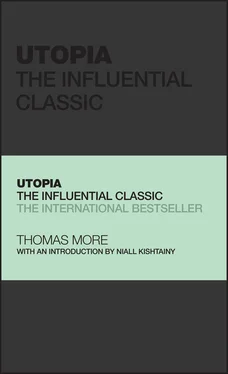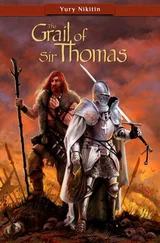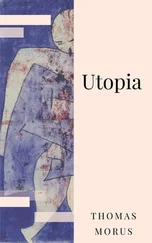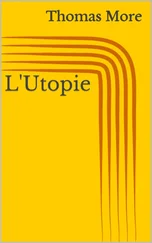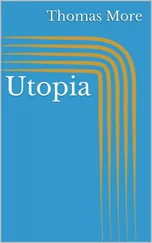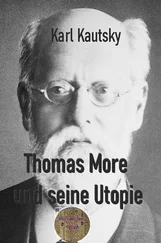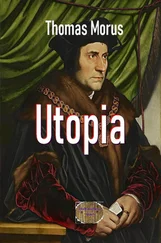One of the most memorable Utopian customs, used to show the Utopians' rejection of opulence, is the making of chamber pots out of gold and the public shaming of wrongdoers by placing gold crowns on their heads. Pearls and diamonds are given to the children for playthings; they discard the baubles as they grow up.
In Utopia everyone works in the fields or at handicrafts, unlike in Europe where societies are dragged down by the wasteful extravagance and idleness of noblemen and their retainers. Because all lend a hand and there is no need for luxuries, the Utopian working day is short and there is plenty of time left over to engage in learning and contemplation. There are only a few laws, simple enough for everyone to understand, and no lawyers. The Utopians come together for their meals, during which a morally improving text is read out and discussed. After dinner, the people play music or converse in their gardens.
Utopia ranges over many questions including: war (the Utopians hate the pursuit of military glory that Europe's princes lust after); the qualities of priests (the Utopians' priests are few in number and truly pious, unlike those in Europe); the functioning of politics (aimed at avoiding tyranny); and marriage customs (divorce is allowed in special circumstances and infidelity is punished). But the communal principle of Utopia is the big theme that encompasses all of these, and at two places in the book Raphael pauses his travelogue to deliver tirades about the impossibility of justice in societies based on private property. More and Giles raise objections, arguing that without private property society could not function because people would not bother to work. Raphael is undaunted. The rich will always exploit the poor, he says, through private fraud and by capturing the law. Policies to mitigate these defects will never have much of an effect while there is still private property. Raphael hails Utopia as the best commonwealth because with everything held in common everyone is guaranteed their subsistence. The abolition of property and money ends fraud, murder, disorder, and anxiety. What would stop the adoption of utopian arrangements, then? Human pride, which measures fortune by the ill‐fortune of others.
UTOPIA AND THE REAL WORLD
Utopia is divided into two books. Book One begins with the fictional More's meeting with Raphael, then leads into a series of dialogues between Raphael, More, and Giles. Raphael's recollections of conversations that he had while visiting England introduce a number of other characters. These first conversations are not about Utopia directly, the topic of the island appearing almost as an aside.
On hearing Raphael's descriptions of the different societies that he saw during his travels, Giles says that Raphael should become an adviser to a king, where his knowledge could be put to good use. But Raphael says that courts are places of flattery and rigid convention where the ideas of visionary philosophers are misunderstood and ignored. Much of the rest of Book One is a tug of war between Raphael on one side and More and Giles on the other, the latter two pressing the case for public service on the unshakeable Raphael.
During this discussion Raphael reports a conversation that he had in England that shows the futility of serving kings. At a dinner, a lawyer had praised the harsh punishment given to thieves. Raphael replied that such punishments were pointless and wrong because in an unjust society the poor had to steal to survive. Then comes a famous passage in which Raphael identifies another cause of theft: sheep, which in their grazing swallow up people and whole villages. Raphael is condemning the enclosure of land then underway in England in which agricultural common lands were fenced off and turned over to the raising of sheep for the lucrative wool trade. As a result, farming communities were thrown off the fields and into poverty. The lawyer rejects Raphael's argument for less severe punishments, claiming that they would threaten public order. The other guests agree with the lawyer, but when the distinguished master of the house says that Raphael's argument may have merit, they quickly do an about‐turn. This, says Raphael, illustrates his point that courts are filled with sycophants who simply parrot what they think their masters want to hear.
How do Books One and Two relate to each other? Book Two in narrative terms is the less complex, consisting mainly of Raphael's description of Utopia. More actually wrote this book first. Book One is a swirl of voices, in turn quizzical, curious, and disputatious, that together probe questions of practical politics and statecraft seemingly removed from the grand social vision of Book Two. It is telling that More began Book Two while on a sojourn away from his usual London life and turned to Book One when back in the city and immersed again in his legal and official duties. Book One frames Book Two by exploring how radical solutions can be made into reality. Can we hope for utopia in a world of imperfect politics?
This question has lain at the heart of utopian debates ever since, echoed in the argument between Raphael, More, and Giles about where visionaries should employ their talents. To maintain their ideological integrity, many utopians have since followed Raphael in wishing to stay aloof from the grubby, compromised world of politics.
At the end of Book One, the fictional More sets out a middle way. Raphael's social visions are speculative and abstract and hard to fathom for most people, says More. In the court of a king they would fall on deaf ears if expounded without taking proper account of the context. The problem is that such abstract philosophy lacks sensitivity to its setting and its audience – to the stage on which political life is played out. More instead advocates a philosophy that is tailored to the audience, one pursued by the wise visionary who realizes that though politics is imperfect there is no reason to stay aloof from it. Through tact and judgement one may manage things ‘so that, if you are not able to make them go well, they may be as little ill as possible’.
As More worked on Utopia, he was himself facing the question of
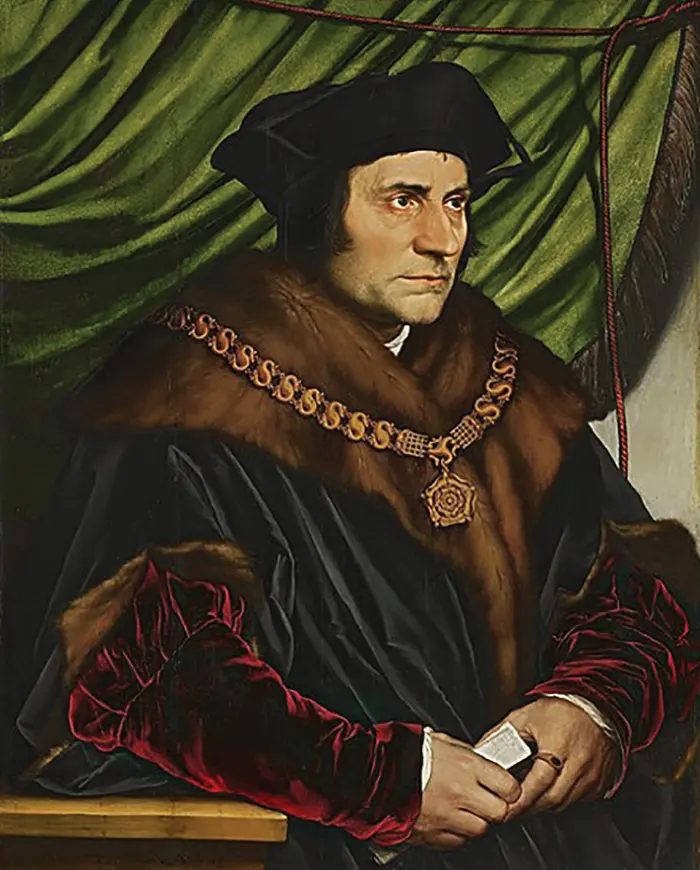
Hans Holbein's Sir Thomas More (1527), Frick Collection
whether to get more closely involved with political life by becoming a royal official. From a young age, More had moved in circles of privilege and influence and seemed destined to hold high office. But he was also a person of deep spiritual yearning. At the beginning of his legal career in the early years of the sixteenth century, More undertook intense theological study. One result was his lectures on St Augustine. He also attached himself to the Charterhouse, a Carthusian monastery just outside London's city walls, where he followed a regimen of prayer and fasting.
An important part of More's later image is that during these years he was hankering after the life of a scholar‐monk, but was being sought out as an official by the king. It was said he was reluctant to agree to royal service, wanting to serve God and not the worldly intrigues of the court. His friend, the great Dutch scholar Desiderius Erasmus, claimed that More had to be ‘dragged’ to court.
It is true that More disliked the pomp and ostentation of court culture. But on his return from Bruges he was a regular visitor to court, always making sure to pay his respects to the Lord Chancellor, Thomas Wolsey. It is possible that the perception of More as a reluctant courtier is part of the busy legend‐making pursued by himself and by his friends and early biographers. In all likelihood, More was simply seeking the middle way that his fictional alter ego in Utopia recommended: to be an intellectually independent but practical courtier who, despite the compromises of political life, sought at least to do some good and to reduce harm. Thus, in 1518, More became a member of the King's Council and soon became the king's secretary. He acted as a go‐between between Henry and Wolsey, who, until his fall in 1529, would be England's most powerful official.
Читать дальше
